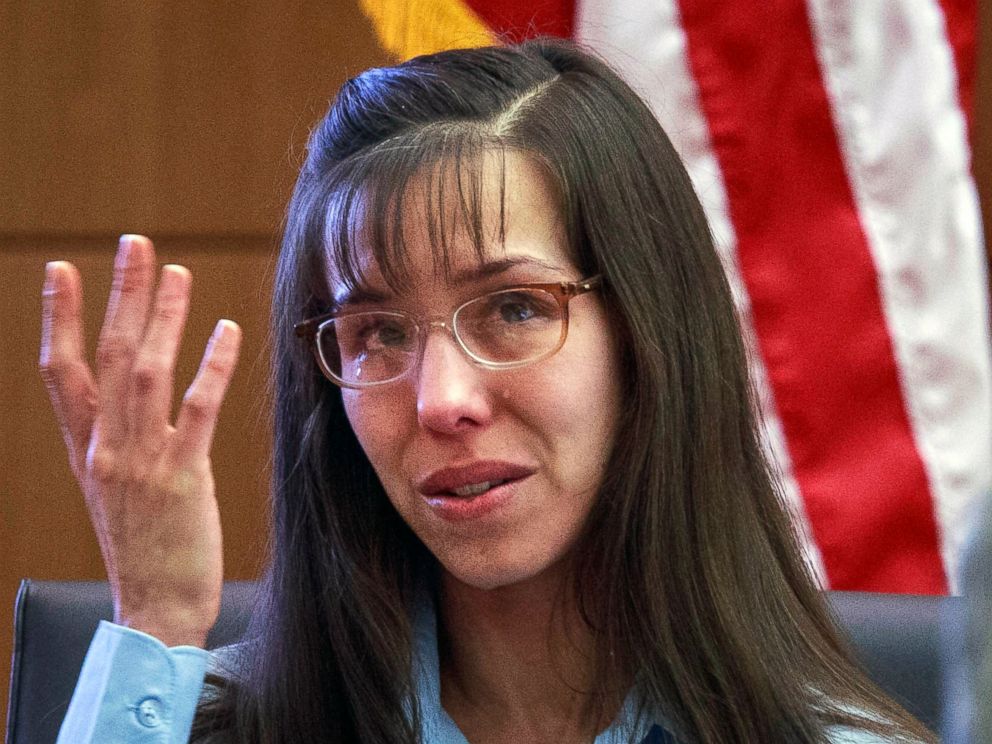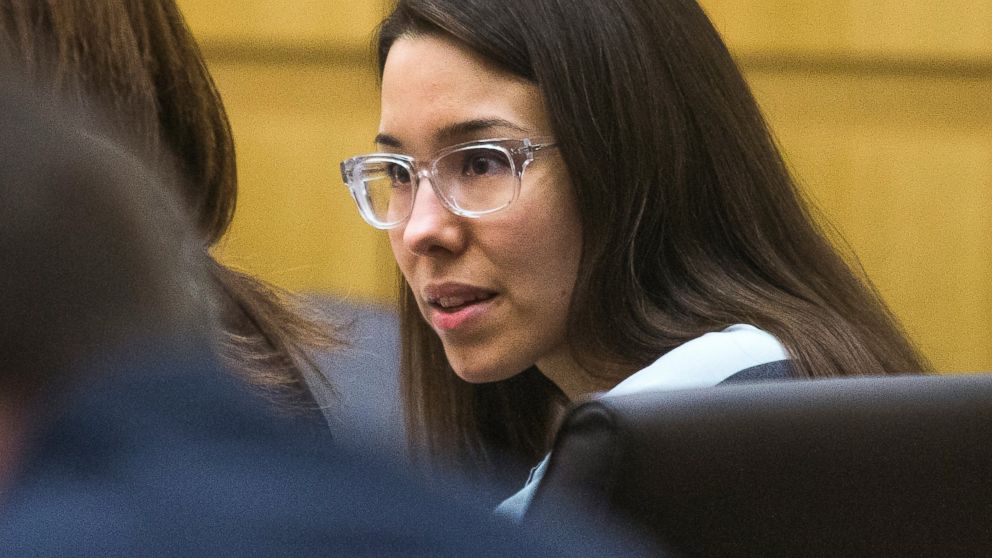Jodi Arias Trial: Unpacking The Shocking Case & Aftermath
Could a single act of violence truly captivate the world, sparking debates on justice, media, and human nature? The Jodi Arias trial did precisely that, becoming a cultural touchstone. This high-profile case, which unfolded in the full glare of media scrutiny, explored the dark recesses of human relationships, raising uncomfortable questions about betrayal, manipulation, and the blurred lines between right and wrong. It became more than just a courtroom drama; it was a societal examination, a reflection of our fascination with the sensational and the complexities of the human psyche.
From its initial stages to its final, often shocking, pronouncements, the Jodi Arias trial proved to be a relentless cycle of emotions. The constant media coverage amplified the already-existing intensity, turning the trial into an unparalleled experience that drew both legal experts and the general public, and that would forever be etched into the annals of legal history.
This in-depth analysis will dissect the crucial details of the events that culminated in the tragic murder, followed by a comprehensive examination of the trial itself and its lasting impact. It will be a detailed exploration that attempts to respond to the lingering, intriguing, and often perplexing questions that continue to provoke curiosity among many people today.
- Liam Payne Death Hoax Debunking The Twitter Rumor Amp Misinformation
- Shadman Keemstar From Youtube Pioneer To Industry Icon
Biographical Insights: A Closer Look at Jodi Arias' Life
Jodi Ariass name, now synonymous with a nationally televised murder trial, belies a life that, before the events of June 2008, seemed relatively unremarkable. Born on July 24, 1980, in Salinas, California, her early years were colored by personal hardships. These struggles included a strained relationship with her parents and difficulties during her academic endeavors.
| Full Name | Jodi Dawn Arias |
|---|---|
| Date of Birth | July 24, 1980 |
| Place of Birth | Salinas, California |
| Occupation (Prior to Arrest) | Freelance Photographer |
| Notable Relationships | Travis Alexander (former boyfriend) |
| Reference Website | AZ Central - Jodi Arias Case |
Prior to her involvement in the high-profile case, Jodi Arias led what appeared to be a typical life. She worked as a freelance photographer and, by most accounts, lived an average life. Her relationship with Travis Alexander, her former boyfriend, was the central point of the trial. The relationship was intense and complex, filled with controlling behaviors and manipulation that would later be revealed and analyzed in detail during the trial. It set the stage for a series of events that concluded with the tragic death of Alexander.
- Dancing Bear Parties Plan Your Ethical Fun Event
- Sweet Pea Puppy Bowl Your Guide To The Pawsome Event
An In-Depth Overview of the Jodi Arias Trial
The Jodi Arias trial started in January 2013, immediately attracting an unprecedented amount of attention from the media and the public. The trial centered on the brutal murder of Travis Alexander, whose body was found in his Mesa, Arizona, home on June 9, 2008. The prosecution argued that Arias acted out of jealousy and anger, while the defense claimed that she had acted in self-defense.
Key Events Timeline
- June 9, 2008: Travis Alexander's body is discovered in his home in Mesa, Arizona. The circumstances of his death immediately raised suspicions, setting the stage for a complex investigation.
- January 2013: The trial formally commences. The proceedings are widely covered by both national and international media outlets, capturing the public's attention and sparking ongoing debates about the case.
- April 2013: The jury presents its verdict. The decision sparks widespread discussion and debate among the public, legal experts, and the media, with people on all sides attempting to understand the outcome and its implications.
Key Figures in the Trial
The Jodi Arias trial was influenced by many key figures, all of whom played significant roles in shaping the result:
Jodi Arias: The Defendant
Jodi Arias, as the central figure in the case, was subjected to intense scrutiny during the trial. Her emotional testimony and inconsistent statements drew attention and left many questioning her motives and the veracity of her claims.
The Prosecution Team
Lead prosecutor Juan Martinez was essential in presenting a strong case against Arias. His closing arguments were particularly persuasive, focusing on the premeditated nature of the crime. These closing statements had a lasting impact on both the jury and the public.
The Defense Team
Attorneys Jennifer Willmott and Kirk Nurmi worked diligently to defend Arias, claiming she acted in self-defense during a violent altercation. Their strategy was to cast doubt on the prosecution's narrative and to bring to light inconsistencies in the evidence.
Evidence Presentation and Legal Strategy
The trial was heavily reliant on forensic evidence, which included DNA samples, blood spatter analysis, and various photographic evidence. The defense's approach was to refute the prosecution's narrative by introducing doubts about the evidence and suggesting alternative explanations for the events leading to the murder.
Significant Pieces of Evidence
- The photographic evidence that placed Arias at the crime scene played a crucial role in the prosecution's case. These images provided visual support for the prosecution's claims.
- Travis Alexander's diary entries offered valuable insight into the dynamics of their relationship, along with the tensions present between them. This information was crucial to the court.
- Forensic analysis confirming the presence of Arias's DNA at the crime scene further linked her to the murder, reinforcing the prosecution's claim and bolstering the case against her.
Psychological Insights into Jodi Arias
Psychologists and other experts offered insights into Arias's psychological condition. They shed light on potential motives and behaviors. Many of them highlighted her obsessive tendencies, emotional instability, and patterns of controlling relationships.
Key Observations
- Arias demonstrated signs of emotional dependency and jealousy, which may have contributed to the escalation of the conflict.
- Her actions seemed consistent with someone experiencing extreme emotional distress, raising questions about her mental state at the time of the crime and her capacity to make rational decisions.
The Impact of Media and Public Perception
The extensive media coverage of the trial significantly influenced public opinion. Social media platforms facilitated real-time conversations and engagement. This amplified the case's reach and effect, but the situation also resulted in misinterpretations and misinformation. This made it difficult for the public to truly understand the complexities of the case.
Wider Implications
- Increased awareness of domestic violence and its intricacies, sparking essential discussions about the issue and its wide-ranging effects on victims and society.
- Debate over the ethical considerations of media sensationalism and its impact on the justice system, prompting critical discussions about the responsibility of media outlets.
Jury Deliberations and the Verdict
After the long process of witness testimony and the presentation of evidence, the jury reached its final decision. They found Jodi Arias guilty of first-degree murder, a verdict that shocked many due to the contradictory narratives presented during the trial. The verdict paved the way for subsequent legal proceedings and ongoing discussions about the case.
Details of the Verdict
- Guilty of first-degree murder, indicating that the jury believed the killing was premeditated and that Arias had planned the crime.
- Potential sentence: Life imprisonment or the death penalty, contingent on the outcome of subsequent legal proceedings, further emphasizing the gravity of the situation.
The Appeals Process and Legal Challenges
Following the initial verdict, Arias filed multiple appeals, contesting various facets of the trial. The appeals focused on errors in procedure, misconduct by the jurors, and other issues that might have influenced the fairness of the proceedings. As of the most recent updates, her case continues under review, with ongoing legal battles determining its future and potentially overturning the original decision.
Legal Precedents Established
- Emphasized the importance of juror impartiality in high-profile cases, reinforcing the need for fair and unbiased trials.
- Highlighted the necessity for transparent legal processes, ensuring that justice is served fairly and equitably, and that the public can have faith in the legal system.
Long-Term Effects on the Justice System
The Jodi Arias trial had profound effects on the American justice system. It prompted discussions about the role of the media in legal proceedings, underscoring the need for balanced and responsible reporting. The case also highlighted the importance of addressing domestic violence and mental health issues within the judicial framework. It served as a catalyst for systemic changes to promote fairness and transparency.
Changes Initiated
- The implementation of stricter guidelines for media coverage of trials ensures that public discourse remains informed and balanced, minimizing the potential for biased reporting.
- An increased focus on mental health evaluations in criminal cases acknowledges the crucial role mental health plays in comprehending and addressing criminal behavior.

Jodi Arias Trial Telegraph

PHOTOS The Jodi Arias murder trial ABC11 RaleighDurham

Jodi Arias' Death Penalty Trial What to Expect ABC News